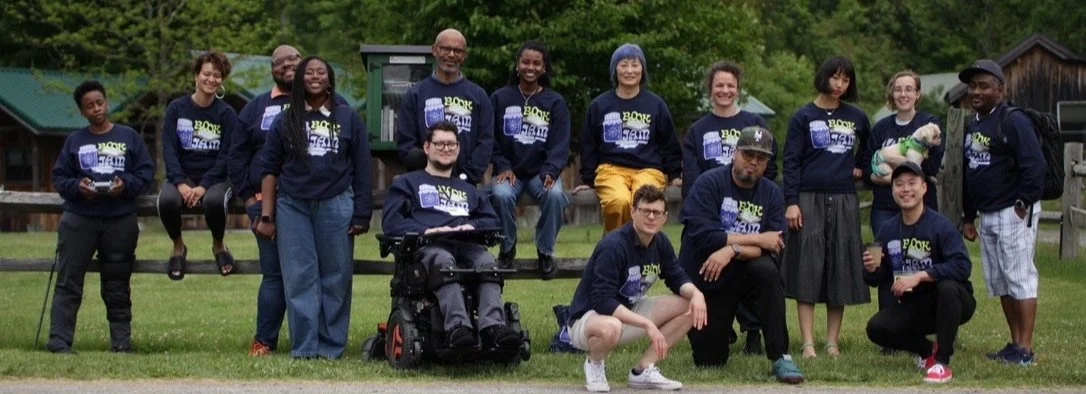Book Jam 2023 Recap
In July 2023, the DISCO Network participated in another five-day Book Jam, this time with 14 scholars in the Pennsylvania Catskills. The result of this week of intergenerational collaborative writing was a new monograph, Technoskepticism (coming soon). Since scholars in the humanities rarely get the luxury of writing together like this, we wanted to ask our scholars more about what they learned from the process. They shared some event highlights and some challenging aspects of collaborative writing.
Q: What was your favorite experience or moment from the 2023 Book Jam?
Rianna Walcott: I really enjoyed the opportunity to spend time with the rest of the DISCO network! It's such a wonderful group of people to work with and be in community with, and I really appreciated the opportunity to spend physical time together.
Q: Can you share a highlight of Technoskepticism?
Jeff Nagy: David and I have spoken a lot over the past year about the concept of care and where it falls short. In Technoskepticism, we had the chance to take those conversations and really work something out, something that didn't really come from either one of us but truly from the collaboration, and that, in part because of that, felt deeply, surprisingly new.
Rianna Walcott: I enjoyed the mixture of academic writing and personal reflection - it gave an opportunity to collaborate in areas I don't consider myself expert in, and also does important work in establishing lived experience *as* expertise!
Huan He: A highlight of the book was seeing how so many powerful personal anecdotes could animate the already insightful arguments in each chapter. It really showcased the intergenerational force behind the book and great style choices for collaborative writing.
Q: What is the most valuable thing that you have learned or taken away from the Book Jam?
Rianna Walcott: That I am capable of writing large amounts under pressure, how collaborative processes can be ultimately generative, what my writing style looks like in comparison to other academics! It has given me a lot more faith in my own skills and confidence in my positioning as a scholar within my field.
Huan He: There's nothing like a ticking clock to really get you to say what you mean. I usually don't enjoy pressured writing environments (and if you asked me in the moment, I probably didn't), but in retrospect, I loved riffing off of ideas with my co-authors. It almost felt like we were "yes, and"-ing each other, taking ideas as far as they could go before we either kept them or discarded them. I deeply enjoyed being in an intellectually unfiltered space, and I hope to cultivate this more in my work (or collaborations) moving forward.
How was the experience of engaging in collaborative writing? Were there moments of generative friction? After participating in Book Jam, would you recommend collaborative writing to someone else? Why or why not?
Jeff Nagy: In my own solo writing, I sometimes get stuck on the idea that every word has to be exactly right — an anxious perfectionism that can wind up being inhibiting. Working on Technoskepticism was (pleasantly) the opposite: I knew that anything I touched would go on to someone else, who'd clean up some of my oversights and errors, and I'd do the same for whatever circled back around to me. I felt looser and happier working this way than I often do on my own.
Rianna Walcott: I would recommend this, I think writing can be a very insular experience and working collaboratively forces you to engage with other writing styles which are ultimately of service to your own style. The friction itself was incredibly generative because it forced me to clarify my own perspectives that I may have previously taken for granted. Usually the process of receiving feedback is a protracted one, in this case I was able to adapt and improve my writing within such a short period of time!

